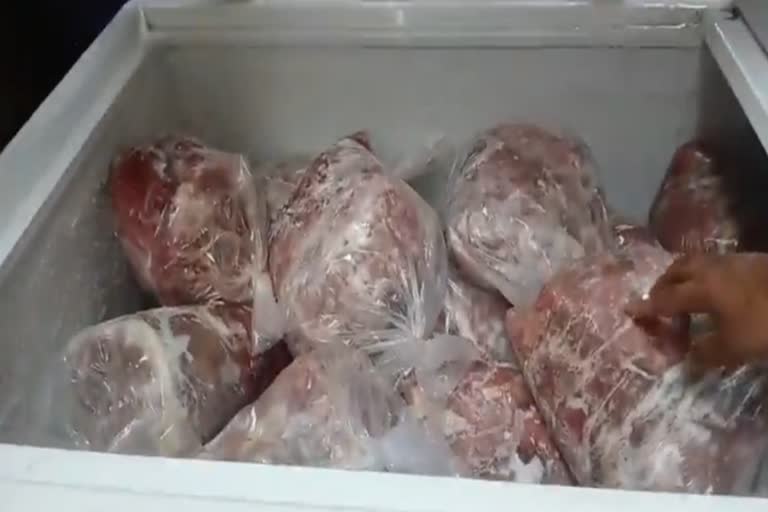A Risky Trade in Kashmir
By: Javid Amin | 07 September 2025
On September 7, 2025, enforcement officials at Srinagar Airport made a startling discovery—340 kilograms of unlabeled meat stashed in the cargo section, ready for distribution in the Valley. The consignment had no labels, no manufacturer details, no billing, and no traceability.
It wasn’t rotten. It wasn’t smuggled across borders. Yet it was illegal, unsafe, and unaccounted for.
The seizure wasn’t just about meat—it exposed a shadow food supply chain in Kashmir, where traders gamble with law and public health for high margins. In a region where food demand is rising and oversight is weak, profit often trumps precaution.
The Incident: How 340 Kg of Meat Was Seized
-
Location: Srinagar Airport Cargo Section
-
Date: September 7, 2025
-
Authorities involved: Food Safety Department + Sales Tax Department
-
Seized: 340 kg of unlabeled meat consignment booked by a Srinagar-based dealer
Violations Detected:
-
No manufacturer details
-
No date of processing
-
No packaging source
-
No bills, receipts, or licenses
Officials clarified that while the meat was not visibly decayed, the absence of traceability meant it could not be certified safe for consumption.
The Bigger Picture: Missing Labels, Missing Accountability
The absence of labeling isn’t a clerical lapse—it’s a deliberate evasion. Under India’s Food Safety and Standards Act (FSSA):
-
All meat must carry processing date, batch number, expiry date, manufacturer address, and license number.
-
Without labeling, there’s no way to verify hygiene, origin, or shelf life.
-
Unlabeled meat could come from illegal slaughterhouses, unsafe handling facilities, or unlicensed suppliers.
In Kashmir’s fragile food economy, missing labels equal missing accountability.
Why Traders Risk It: The Profit Motive
Despite high risks of seizure, fines, or even jail, traders continue. Why?
1. High Demand, Limited Supply
-
Meat is a staple in Kashmiri cuisine. Demand surges during festivals, weddings, and tourist seasons.
-
Local slaughterhouses often fail to meet hygienic or quantitative needs.
2. Huge Profit Margins
-
By bypassing taxes, licenses, and hygiene checks, traders save 20–40% of costs.
-
Unverified consignments sold as “premium” fetch high returns.
3. Weak Enforcement
-
Airport cargo checks are inconsistent.
-
Past offenders often face temporary suspensions, not permanent bans.
👉 Result: Traders calculate that the risk is worth the reward.
Food Safety Loopholes in Kashmir
This seizure is not an isolated case. It highlights systemic weaknesses:
-
Airport Cargo Screening: Not all consignments are checked thoroughly.
-
Understaffed Departments: Food Safety officers are few compared to Kashmir’s food trade volume.
-
Corruption & Influence: Traders exploit political or bureaucratic connections.
-
Reactive Enforcement: Seizures happen after arrival, not through proactive prevention.
Earlier in August 2025, authorities destroyed 12,000 kg of substandard food items—including unhygienic meat and stale bakery goods.
Clearly, seizures are symptoms, not solutions.
Public Health Risks
Even though the seized meat wasn’t spoiled, unverified products carry grave dangers:
-
Zoonotic Diseases: Meat from unregulated sources can spread infections like brucellosis, anthrax, or salmonella.
-
Antibiotic Resistance: Illegally reared animals often overuse antibiotics, creating resistant strains.
-
Food-Borne Illnesses: Improperly stored meat can trigger food poisoning outbreaks.
In a region with limited hospital capacity, even a small-scale outbreak can strain the system.
Legal Action & Enforcement
Following the Srinagar Airport seizure, authorities:
-
Cancelled the concerned dealer’s license
-
Sent meat samples for lab testing
-
Initiated investigation under FSSA 2006 provisions
But experts argue that penalties are too mild. Repeat offenders exploit legal loopholes, paying fines as “business expenses.”
Editorial Analysis: The Real Story Behind the Meat
The seizure symbolizes a deeper tension in Kashmir’s economy:
-
Profit vs Public Health – Traders see margins; consumers bear the risk.
-
Oversight vs Influence – Enforcement exists, but often bends under pressure.
-
Demand vs Supply – Growing urban appetite vs shrinking hygienic production.
Unless Kashmir reforms its food supply chain, these incidents will repeat—turning public trust into collateral damage.
The Way Forward: Reforms Needed
-
Stricter Airport Checks – Deploy digital cargo scanning, random sampling.
-
Meat Traceability Systems – QR codes on packaging to track origin.
-
Permanent License Revocations – Zero tolerance for repeat offenders.
-
Consumer Awareness Campaigns – Educate public to demand labeled products.
-
Boost Local Production – Modernize slaughterhouses with hygienic facilities.
Editorial Takeaway
This case isn’t just about 340 kg of meat—it’s about the mindset of risk-for-profit.
When oversight is weak, traders normalize dangerous practices. And when consumers stay unaware, they pay the ultimate price.
Kashmir needs systemic reform, stronger enforcement, and public vigilance—because in the food trade, every missing label hides a bigger story.




